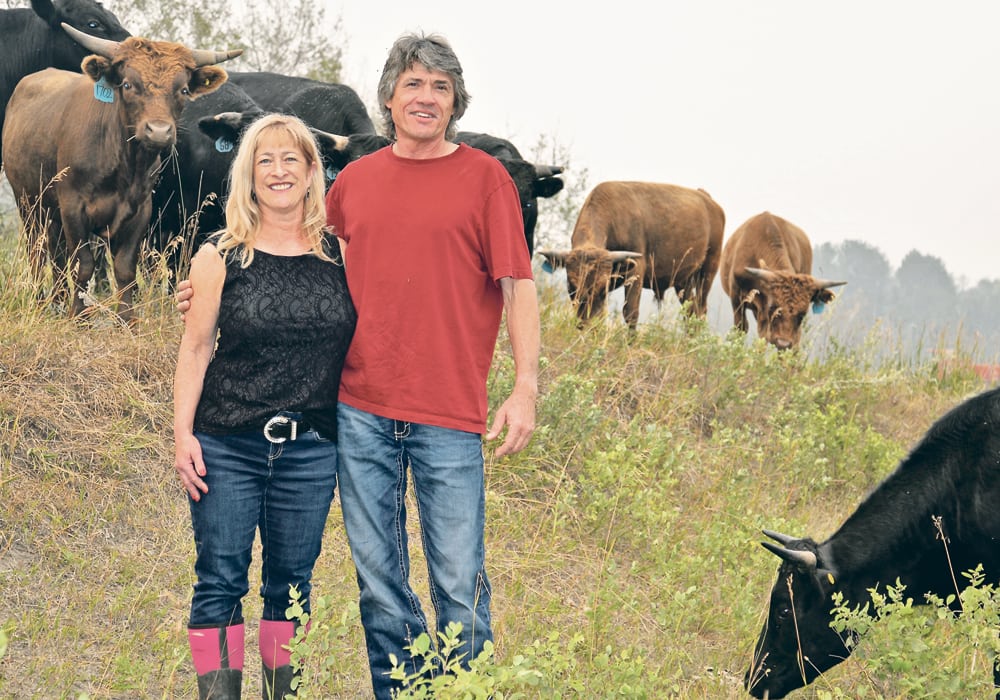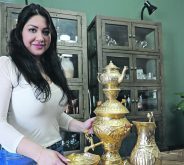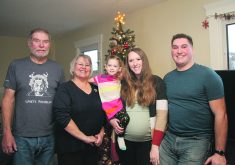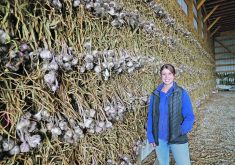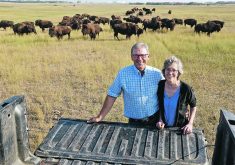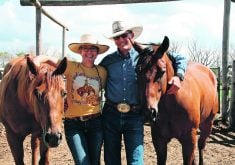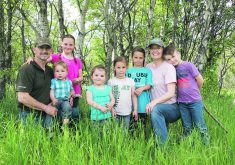On the Farm: Tracey Burke and Brian Odgaard rent summer pasture and winter the herd on their 20-acre property
PINE LAKE, Alta. — When Tracey Burke says she doesn’t cheat on her cows, she’s referring to the fact that the only beef she eats is the 100 percent grass-raised, hormone-free Dexter beef that she and her husband Brian Odgaard raise at Ghost Pine Dexters.
“And I don’t buy meat in grocery stores or order it in restaurants,” she said.
Odgaard said Ghost Pine doesn’t advertise its beef as antibiotic free because they will use it to treat a sick or suffering animal, but that is the only time antibiotics are used.
Read Also

Know what costs are involved in keeping crops in the bin
When you’re looking at full bins and rising calf prices, the human reflex is to hold on and hope for more. That’s not a plan. It’s a bet. Storage has a price tag.
The couple’s three dogs don’t cheat on the cows either. Their raw food diet is also from Dexter beef.
“A big part of the raw food is the bones,” said Burke.
As well as helping to keep the dogs’ teeth clean, gnawing on bones provides calcium and other nutrients found in the bone and marrow.
“And bones are great babysitters,” said Burke.
The couple’s Dexter cattle number about 130. They rent summer pasture from neighbours and winter the herd on their 20-acre property.
“Feed costs are a challenge,” said Odgaard.
Hay costs from $125 to $200 per bale, depending on the year. This is somewhat offset by minimal machinery expenses.
Odgaard said that along with a trailer to haul hay, a tractor is his only necessary piece of equipment: for feeding, moving hay, and plowing their driveway in winter.
Burke and Odgaard direct market Ghost Pine Dexters.
“We’re more of a niche market. We don’t sell at auction,” said Burke.
They promote their animals via word of mouth and through their Facebook page Just Clean Beef, as well as on Instagram.
“We just got into social media this year.”
A grass-finished animal takes longer to finish than grain-fed and is promoted as a healthier alternative: lower in total fat and calories, higher in levels of heart-healthy omega-3, lower in saturated fats, and higher in vitamin E and the minerals calcium, magnesium and potassium.
“Our cattle are market ready in 24 to 30 months, said Odgaard.
The couple are seeing a shift from people buying what is readily available at the grocery store to wanting to know the back story of the products they buy.
“People are starting to care where their food comes from, how it’s raised, what’s in it. They’re wanting more and more to buy local,” said Burke.
She practices what she preaches.
“We source all of our chicken, eggs, and honey from local producers. I want local people to buy from me so I want to buy from them.
“I found that when I made the decision to source products locally, it really wasn’t that much more expensive. You just have to look.… And it’s better quality.”
For Burke, this extends to products such as cosmetics, and bath and body items.
“I don’t buy products that are tested on animals”.
The couple are passionate about the health and well-being of their animals, which they say bring so much joy to the homestead.
They reciprocate by giving a whole life experience with no feedlots, no auctions and no stress.
“We are accountable to our animals right from birth to death,” said Odgaard.
They have also seen a growing interest in the quality and origins of pet food. They moved away from store-bought pet food years ago.
“Our dog food is human grade,” said Odgaard “Slaughtered at the provincially inspected abattoir. This way I know what I’m getting.”
Burke and Odgaard moved to the rolling hills and treed grasslands in the Pine Lake area from Red Deer in 2001.
It’s been a learning process.
“Neither one of us comes from a farm background,” said Burke.
She was raised in cities, moving from Toronto to Calgary to Red Deer.
Odgaard was a town kid from a few kilometres north at Ponoka.
The couple love their acreage.
The previous property owners were set up for livestock. In addition to the house, there was a barn, outbuildings and corrals.
“We mulled around lots of ideas but none worked.”
For the first seven or eight years neighbours put up hay on the property, just to keep the grass down.
“Then a friend of ours mentioned Dexter cattle,” said Odgaard.
After conducting some research on the naturally small breed, they bought their first Dexter cattle 10 years ago. Mature cows weigh between 600 and 700 pounds. Mature bulls reach about 1,000 lb. Dexters are a hardy breed with a robust immune system. They are known to be a calm, dual-purpose breed used for milk and beef.
The couple work off farm at the same large corporation where they met in 1997; she in the office and he at the plant. Odgaard works a compressed schedule; long shifts multiple days in a row followed by a stretch of days off. It allows him uninterrupted time for projects at home.
And it’s good for the psyche.
“I can have a bad day at work,” he says, “but then as soon as I get out with the cows it just all goes away.”

